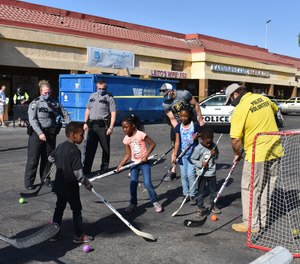
A new report highlights many examples of positive community-police engagement from 58 police foundations
By Tom Kovach
After the protests in cities across the country last summer were followed by overwhelmingly negative news reports of harmful and disturbing community-police conflicts, leadership at police foundations addressed the need to promote positive examples of community-police engagement that take place daily throughout the nation.
Police foundations have been around for almost 50 years, yet, there had never been a national study of police foundations and community engagement until now. The Las Vegas Metropolitan Police Department Foundation recently commissioned a survey of 250 police foundations that exist in the U.S. and Canada to identify and publicize positive examples of community-police engagement.
The result is the Positive Community-Police Engagement Report (available in full below). The survey of police foundations as successful independent community-led nonprofit organizations provides, for the first time, data to support continued sustainability and growth.
A large percentage of communities might not even know police foundations exist or the vital role they play when it comes to building bridges between law enforcement and the communities they serve. Hopefully, an evidence-based approach will counter misconceptions about police foundations and lead to productive dialogue and future support and expansion of police foundations across the nation.
Police practitioners and research partners spearheaded the start of ongoing research on police foundations. Dr. Theron Bowman is a former Arlington (Texas) chief of police who started a police foundation and consults on police and public practices, and Dr. Jessica Herbert began her career as a detective with the Fairfax County Sheriff's Office. She continues to support public safety as a national advisor for criminal justice research and reform. Joan Brody, a public safety and grants advisor, also contributed significantly to the project.
This study establishes that police foundations are essential to making meaningful improvements in public safety. We hope it will encourage policymakers, government leaders, community members and business leaders to join the conversation regarding ways to effectively support community safety through police foundations.
How foundations support positive police-community engagement
The report highlights many examples of positive community-police engagement from 58 police foundations covering small, medium and large cities. The results represent jurisdictions with populations totaling over 39 million people and police/sheriff's departments with more than 50,000 sworn members.
Highlights of the report include:
The variations among police foundations suggest the need for a national approach to defining the purpose and intention of police foundations and other collaborations in community policing and police transformation.
It gives me great pleasure to cite one example of positive community-police engagement from my backyard. In 2020 the U.S. Attorney's Office presented the Attorney General's Award for Distinguished Service in Policing – Innovations in Community Policing to six officers and detectives of the Las Vegas Metropolitan Police Department - Bolden Area Command . Historically, the Bolden Area Command is in the heart of one of the most economically and crime-challenged places in Southern Nevada.
The Bolden Little League started with the idea of a free baseball league for children in the community, with police officers coaching the teams for an entire season. Play started in spring 2017, with five teams comprising 70 children between 8 and 10 years old. Since then, the age range has expanded – now allowing children from 6 to 12 – while remaining free-of-charge for families. Through their efforts, the honored officers and detectives built public trust and positive relationships with children and their parents. The neighborhoods surrounding the park posted a 76% reduction in violent crime from 2018 to 2019.
As police departments anticipate municipal budget cuts across the nation in 2021 resulting from increased costs and decreased revenue due to COVID-19, police foundations and the public-private partnerships that they represent will be needed even more. Police foundations may be called upon to take on more community-police engagement as cities seek restoration from 2020 protests. This effort will be necessary for police foundations to help seed and test new community-police engagement programming or partnerships to support needs and strengthen relationships.
Our hope is for police foundations to continue supporting the positive community-police engagement programming that the report revealed and introduce new programs to be tested in the field by law enforcement and public safety agencies.
NEXT: Form a non-profit to bridge the gap for law enforcement funding needs
Positive Community-Police Engagement Report by epraetorian on Scribd
About the author
Tom Kovach is executive director of the Las Vegas Metropolitan Police Department Foundation, a 501(c)3 non-profit organization that raises funds to support and supplement hundreds of Las Vegas Metropolitan Police Department programs and initiatives that help keep the community safer.
Copyright © 2025 PoliceGrantsHelp.com. All rights reserved.

